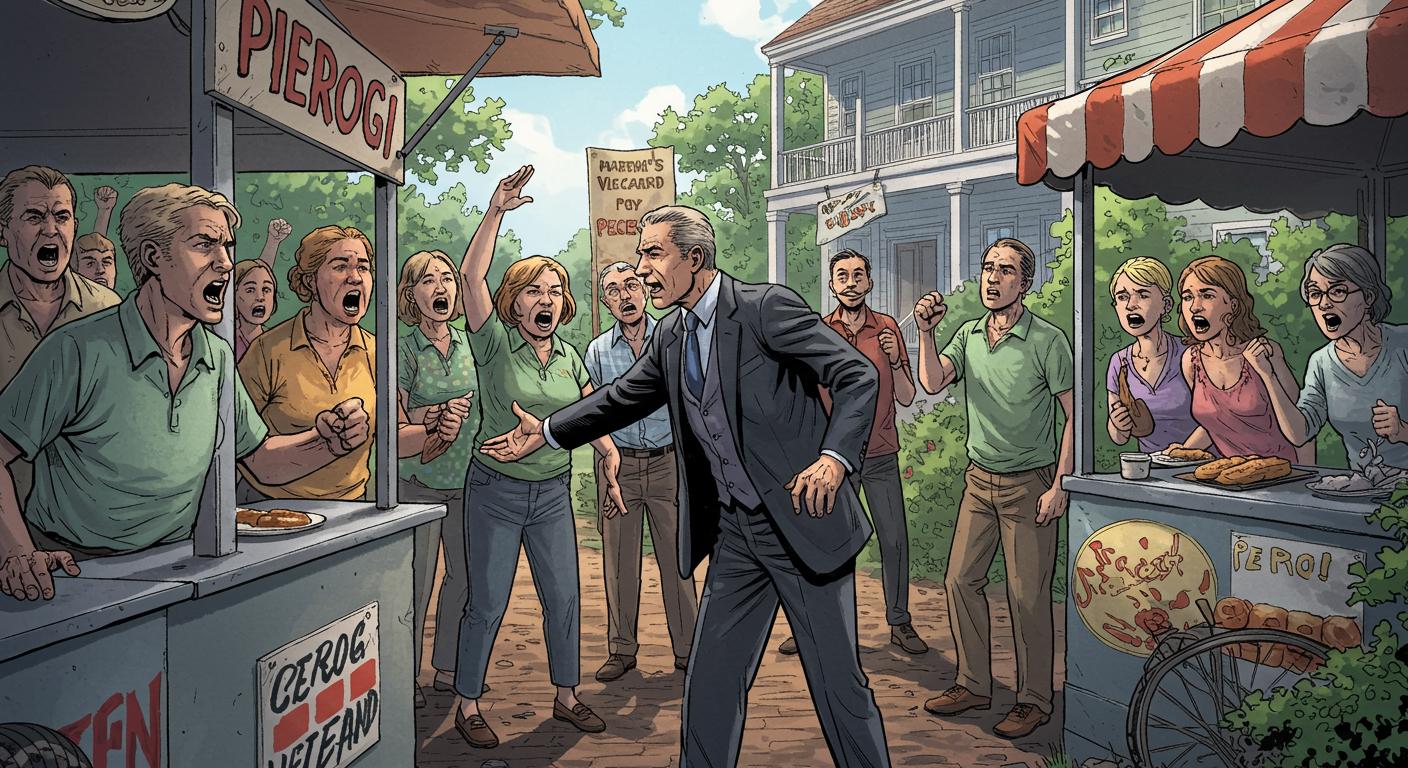Alan Dershowitz, Harvard Law emeritus, lawyer to presidents and to Jeffrey Epstein, was denied a pierogi—again. The phrase feels unmoored from the real world, like “Salvador Dalí turned away at a pancake breakfast.” Yet the landscape is very much Martha’s Vineyard, the dumplings in question are from a vendor called Good Pierogi, and what started as an awkward moment has snowballed into a full-scale, potato-stuffed legal and moral standoff.
This Week’s Specials: Potato, Cabbage, Controversy
For the second week running, Dershowitz’s quest for pierogi at the West Tisbury Farmers Market ended not with a full plate but with a public rebuff. According to The Independent, Dershowitz had attempted to buy pierogi “in an effort to try to restore community,” after having threatened legal action against Good Pierogi for refusing to serve him the prior week. The vendor, Krem Miskevich, did not seem in the mood for a reconciliation—at least not the kind Dershowitz was after.
The Independent recounts the ritualistic qualities of both confrontations: Dershowitz approaching the tent, book in hand (a signed copy, naturally), while a growing crowd hovered in anticipation. Supporters chanted “Time to go” and “Go home, Alan!” Once again, no pierogi for the famed attorney—just the sizzle of frying onions and the background hum of island residents deciding, very publicly, who gets which dumplings.
The escalation wasn’t limited to food service drama. The outlet details how Dershowitz lobbed accusations of discrimination and antisemitism at the vendor, later calling Good Pierogi’s offerings “tainted with the poison of antisemitism” in a social media post, urging a boycott. He claimed his exclusion boiled down to his support for Donald Trump and his notorious legal associations (including Jeffrey Epstein), and insisted that this was a matter of being targeted for his Jewish heritage and pro-Israel stance.
As noted by The Independent, Dershowitz pointed to Miskevich’s participation in an anti-genocide protest outside Martha’s Vineyard’s Jewish Culture Festival as proof of antisemitic leanings. However, the original organizer of that protest, Talia Weingarten, clarified—according to comments gathered by the Martha’s Vineyard Times and relayed within The Independent’s coverage—that the demonstration was a stand against violence and oppression in Gaza, not an attack on Jewish identity or culture as a whole.
The Legalities of Pierogi Denial
Legal recourse in the matter of potato dumplings does seem, as described in The Independent’s summary of local expert opinion, a challenging case to make. Attorneys pointed out to the Martha’s Vineyard Times, as cited by The Independent, that political beliefs such as Zionism are not recognized as protected status under consumer law, unlike religion or race. So, while representation of certain controversial clients or strongly voiced opinions may generate unpopularity in line, it doesn’t guarantee anyone the absolute right to a serving of pierogi in West Tisbury.
In a lengthy Good Pierogi Instagram post referenced by The Independent, Miskevich, who co-owns the stall with their spouse Lily Rose, explained their “surge of emotion” when Dershowitz appeared last week, connecting this reaction to his professional history of defending people they view as “sexual predators and abusers including Jeffrey Epstein.” Following that, Miskevich stated that when they hesitated to serve him, Dershowitz “began to harass us, misgender me, and film us without our consent”—allegations that also surfaced during the highly public encounter.
The post also addressed Dershowitz’s antisemitism claims. Miskevich wrote that they are Jewish themselves, with immediate family living in Israel, and that friends call them “Rabbi Krem.” As further noted by The Independent, they closed with “Finally, we don’t back down to bullies – no matter their size.”
When Dershowitz reapproached the vendor (bearing a signed copy of one of his books, just in case), he claimed to be there “to restore community” and asked Miskevich to sell him “any one of your products to show that you’re prepared to sell to anybody and not allow your anti-Zionism to decide which people you’ll sell to.” Miskevich responded, in words recorded by The Independent, “I am very surprised that you’re here because of the things that you’ve been saying about us and the business online. I really do not appreciate what you’ve been sharing in the last week.”
The debate grew testy, with Dershowitz insisting all his statements were true. When pressed for evidence of antisemitism, Dershowitz cited Miskevich’s protest involvement. At this, The Independent notes, Weingarten reiterated that the protest was propelled by Jewish values against genocide, not opposition to Judaism or Israel per se.
A Market Full of Ironies
Each side insisting the other is the true bigot turned the encounter into a kind of circular irony. In scenes detailed by The Independent, one customer erupted, “My grandparents died in the Holocaust! Don’t you call me an antisemite,” while another added, “My Jewish culture is a history of resistance to genocide. We are not antisemites, we stand against the oppression of all people.” With Miskevich pleading for Dershowitz to “stop being a bully” and Dershowitz replying, “You’re the one who won’t sell me my pierogi!” one might start to lose track of which grievance began where. More layers here than in an onion pierogi, truly.
As the crowd’s chants of “time to go” increased, The Independent reports that the market manager finally asked Dershowitz to leave. This encounter ended without police involvement—just a round of applause for the pierogi stand and a lawyer shuffling away, still peckish.
Interviewed by the Martha’s Vineyard Times, as referenced in The Independent, Dershowitz predicted that community support would favor Good Pierogi because “much of Martha’s Vineyard is anti-Israel.” He dismissed Miskevich’s Instagram account as a “post facto excuse,” adding, “some of the worst antisemites in the world have Jewish background and Jewish heritage.”
The Custom of Hospitality (And Its Discontents)
One can’t help but be struck by the ritual importance of food in moments of social tension. The Independent’s coverage has all the ingredients: defiant vendors, combative customers, and a legal heavyweight reduced to sparring for spud-filled pastries. It’s curiously democratic—this is not some disembodied debate, but a matter of whether or not Alan Dershowitz is granted a plate of dumplings at a folding table.
Legal experts interviewed by the Martha’s Vineyard Times, as relayed in The Independent, point out that while Dershowitz has demanded bylaws requiring vendors to sell to everyone, there’s little legal precedent to back this up—political ideology, however vital to one’s identity, isn’t protected on the same level as religion or race. Dershowitz, for his part, dismisses this as “too simple-minded,” insisting Zionism is an essential part of his Judaism.
So, for now, the pierogi remain out of reach for Alan Dershowitz. The West Tisbury Farmers Market, which one might imagine as a sleepy haven for local produce and gentle gossip, is suddenly the stage for a test of law, culture, and the limits of hospitality—served with a side of irony and cabbage.
Sometimes, a pierogi is just a pierogi. And sometimes, it’s the most hotly contested object on the island.







